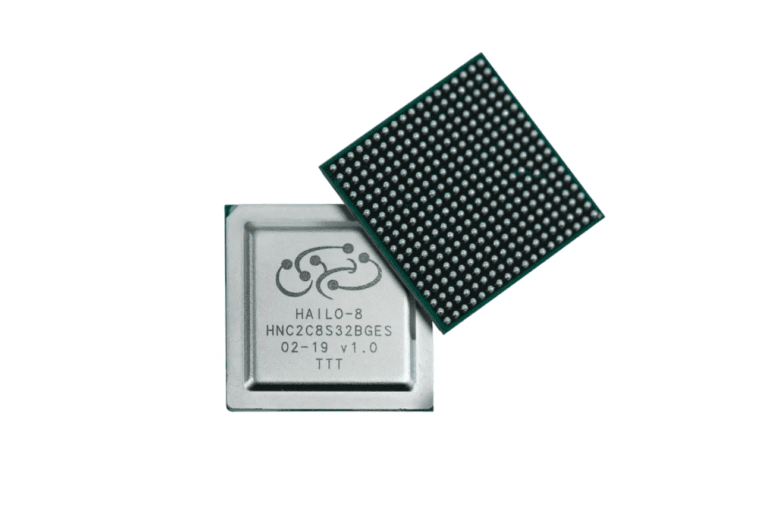- Hailo receives $120 million in funding to compete against Nvidia in the AI chip sector.
- Funding for AI chip startups declines, with U.S. firms raising $881 million from Jan-Sep 2023, down from $1.79 billion in 2022.
- Hailo, founded in 2017, specializes in AI chips for edge devices, boasting lower power consumption and memory usage.
- Despite challenges, Hailo has over 300 customers across the automotive, security, retail, and medical sectors.
- Investors, including Alfred Akirov and Delek Motors, back Hailo’s potential for long-term growth.
- Stanford professor Christos Kozyrakis believes AI accelerator chips like Hailo’s will become essential as AI usage expands.
- Challenges include evolving AI model architectures and software support.
- Hailo’s technology addresses issues with cloud-based AI inference, offering real-time insights without compromising data privacy or reliability.
- Generative AI surge increases demand for Hailo’s hardware across industries.
Main AI News:
The landscape for AI chip startups, once bright and promising, is starting to lose its shine as Nvidia tightens its grip on the market. A recent report reveals a significant decline in funding for U.S. chip firms, dropping from $1.79 billion in the first three quarters of 2022 to just $881 million from January 2023 to September 2023. This downturn has left companies like Mythic facing financial hardship, while Graphcore, once a well-funded competitor, now grapples with mounting losses.
However, amid this challenging environment, one startup stands out for its success in the fiercely competitive AI chip space. Hailo, founded in 2017 by Orr Danon and Avi Baum, former CTO of Texas Instruments’ wireless connectivity division, specializes in designing chips tailored for AI workloads on edge devices. These chips boast lower memory usage and power consumption compared to conventional processors, making them ideal for compact, offline, and battery-powered devices such as cars, smart cameras, and robotics.
Hailo’s CEO, Orr Danon, expressed the company’s mission to democratize high-performance AI beyond data centers. With over 300 customers across various industries, including automotive, security, retail, and medical devices, Hailo has demonstrated its capability to meet diverse market demands.
In a vote of confidence for Hailo’s future, investors including Israeli businessman Alfred Akirov and automotive importer Delek Motors injected $120 million into the company, extending its Series C funding round. Danon sees this fresh capital as pivotal in seizing upcoming opportunities and fostering long-term growth, positioning Hailo as a frontrunner in bringing AI to edge devices.
But can Hailo truly challenge chip giants like Nvidia, as well as Arm, Intel, and AMD? According to Christos Kozyrakis, a Stanford professor specializing in electrical engineering and computer science, the rise of accelerator chips like Hailo’s is inevitable in the era of AI proliferation. Kozyrakis emphasizes the significant energy efficiency gap between CPUs and accelerators, suggesting that the latter will play a crucial role in enhancing efficiency for AI-related tasks.
However, Kozyrakis acknowledges potential hurdles for Hailo, such as the evolving landscape of AI model architectures and the need for robust software support. Despite these challenges, with substantial financial backing and a dedicated workforce, Hailo remains optimistic about its trajectory.
Danon believes that Hailo’s technology addresses key pain points associated with cloud-based AI inference, such as latency, cost, and scalability. By offering solutions that operate independently of the cloud, Hailo enables real-time insights without compromising data privacy or reliability.
Furthermore, Danon sees generative AI as a catalyst for increased demand for Hailo’s hardware across various industries. As businesses seek to process large language models locally, Hailo’s edge AI solutions become increasingly indispensable, catering to sectors ranging from automotive and compute to industrial automation and security.
Conclusion:
The investment in Hailo amidst a downturn in funding for AI chip startups indicates continued interest and confidence in the potential of specialized AI chips for edge devices. Despite challenges in the market, Hailo’s ability to secure significant funding and maintain a diverse customer base suggests a promising future for AI chip innovation outside of traditional data center environments. This underscores the growing importance of energy-efficient AI solutions tailored for edge computing applications, with implications for various industries seeking to leverage AI technology for enhanced efficiency and performance.

